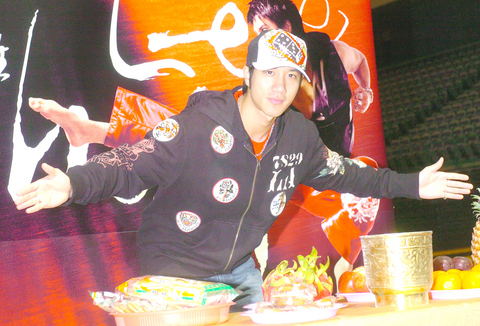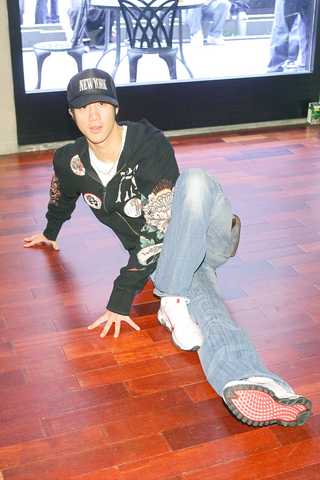It's going to be an exciting, sweat-soaked weekend at the Taipei Arena as one of Taiwan's most famous musical artists, Wang Lee-hom (王力宏) takes to the stage.
Wang, who just a few months ago released his album Heroes of Earth (蓋世英雄), is scheduled to hold concerts on Saturday and Sunday. Afterward, Wang will perform in Hong Kong and Shanghai.
Heroes of Earth is one of the first albums to successfully blend traditional Chinese music with pop music or hip hop. Wang has borrowed heavily from Beijing opera to create a new form of music that has wowed his fans.

PHOTOS: TAIPEI TIMES
Wang has also asked his friends in the music industry to collaborate in creating this "new sound." As such, South Korea's current "it boy" Rain has dedicated his first Chinese song to Wang. Taiwan's May Day (五月天) and even the original Beijing opera singer behind Farewell my Concubine Yan Li (李岩) are also contributing.
Why the emphasis on traditional Chinese culture this time? And furthermore, why the concentration on Beijing opera as the main inspiration?
Wang, who grew up in the US, feels that through the eyes of most Westerners, the most symbolic emblems of Eastern culture are calligraphy, Chinese herbal medicine and Beijing opera. Therefore, what better way to express the magical musical powers of the East than Beijing Opera?

By including Chinese opera instruments such as the erhu fiddle, Chinese gongs, wooden clappers and performing with a rap rhythm and tempo, Wang hopes to show the world the sophistication of Chinese culture and add a new light-hearted perspective so that traditional opera music can be expressed and admired.
Yet for those who are already familiar with Wang and his songs, why go to the concert at all? What surprises can we expect from him on stage?
"There will be a total of 10 people making guest appearances, including England's Westlife, and Taiwan's Mayday," said Scott Hong (
"During the performance, including the different dancers, opera singers and martial arts performers, there will be as many as 100 people on stage. Wang has been furiously practicing wushu.
"Wang's band members were invited to contribute in the pre-production side of things and add to the evolution of the process, so that Saturday's concert may well be a very different affair from the one on Sunday."
The final touch for fans? "One of the songs was composed with the direct help of fans, and [Wang] is very much looking forward to the experience of singing the song hand-in-hand with his fans. For his fans and especially himself, it should be a very intimate and unforgettable experience," Sony's Hong said.
Fusion notes:
What: The 2006 Sony Ericsson Wang Lee-hom "Heroes of Earth" Concert
Where: Taipei Arena, 2, Nanjing E Rd, Sec 4, Taipei
When: Saturday (3/11) and Sunday (3/12), 7:30 PM
Tickets: Tickets cost between NT$800 to NT$3,000 and are available from ERA ticketing outlets nationwide

Even by the standards of Ukraine’s International Legion, which comprises volunteers from over 55 countries, Han has an unusual backstory. Born in Taichung, he grew up in Costa Rica — then one of Taiwan’s diplomatic allies — where a relative worked for the embassy. After attending an American international high school in San Jose, Costa Rica’s capital, Han — who prefers to use only his given name for OPSEC (operations security) reasons — moved to the US in his teens. He attended Penn State University before returning to Taiwan to work in the semiconductor industry in Kaohsiung, where he

On May 2, Chinese Nationalist Party (KMT) Chairman Eric Chu (朱立倫), at a meeting in support of Taipei city councilors at party headquarters, compared President William Lai (賴清德) to Hitler. Chu claimed that unlike any other democracy worldwide in history, no other leader was rooting out opposing parties like Lai and the Democratic Progressive Party (DPP). That his statements are wildly inaccurate was not the point. It was a rallying cry, not a history lesson. This was intentional to provoke the international diplomatic community into a response, which was promptly provided. Both the German and Israeli offices issued statements on Facebook

May 18 to May 24 Pastor Yang Hsu’s (楊煦) congregation was shocked upon seeing the land he chose to build his orphanage. It was surrounded by mountains on three sides, and the only way to access it was to cross a river by foot. The soil was poor due to runoff, and large rocks strewn across the plot prevented much from growing. In addition, there was no running water or electricity. But it was all Yang could afford. He and his Indigenous Atayal wife Lin Feng-ying (林鳳英) had already been caring for 24 orphans in their home, and they were in

Australia’s ABC last week published a piece on the recall campaign. The article emphasized the divisions in Taiwanese society and blamed the recall for worsening them. It quotes a supporter of the Taiwan People’s Party (TPP) as saying “I’m 43 years old, born and raised here, and I’ve never seen the country this divided in my entire life.” Apparently, as an adult, she slept through the post-election violence in 2000 and 2004 by the Chinese Nationalist Party (KMT), the veiled coup threats by the military when Chen Shui-bian (陳水扁) became president, the 2006 Red Shirt protests against him ginned up by